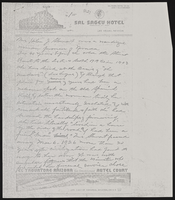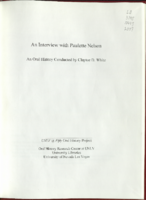Search the Special Collections and Archives Portal
Search Results
Jon E. Cobain Papers
Identifier
Abstract
The Jon E. Cobain Papers (1963-2009) contains material representing Cobain's experience as the first official graduate of Nevada Southern University (later University of Nevada, Las Vegas) in 1964. Materials include photographs of Cobain and his family, a scrapbook from his 1964 graduation day, newsletters, a copy of Beau's Bits Handbook, personal correspondence, and his diploma. This collection is comprised exclusively of digital surrogates.
Archival Collection
Stella Champo Iaconis Papers
Identifier
Abstract
The Stella Champo Iaconis Papers consist of a certificate for proficiency in Rapid Legible Business Writing from the Palmer Method of Business Writing given on May 11, 1927; a certificate of promotion to high school in Clark County, Nevada dated May 25, 1927; and an autograph book signed by classmates at Las Vegas High School in Las Vegas, Nevada in 1928.
Archival Collection
Aaron Williams Photograph Collection
Identifier
Abstract
The Aaron Williams Photograph Collection (approximately 1968 to 1983) consists of three black-and-white photographic prints. Two of the images are of the groundbreaking ceremony of the Senior Citizens’ Center with Las Vegas, Nevada Mayor Oran Gragson, and the third of three unidentified individuals.
Archival Collection

Amber Diskin oral history interview: transcript
Date
Archival Collection
Description
Oral history interview with Amber Diskin conducted by Barbara Tabach on January 5, 2018 for the Remembering 1 October Oral History Project. In this interview, Amber Diskin discusses her experience at the Route 91 Harvest music festival during the October 1, 2017 mass shooting in Las Vegas, Nevada. Diskin talks about finding her way home after escaping the crowds and letting her family and friends know she was not hurt. She speaks of the aftermath of the shooting, including how her children were affected, the post-traumatic stress disorder she developed, and how the shooting has affected her love of concerts. As a native Nevadan, she shares her views of Las Vegas and how her sense of community deepened after this event. Diskin ends the interview by discussing her appreciation for the first responders and the gift baskets she helped distribute to hospitals, police stations, and the fire department.
Text

Stewart family histories
Date
Archival Collection
Description
Stewart family histories
Text
Southern Nevada Jewish Heritage Project
"The goal of this 2014-2015 project is to build a web and mobile resource that will connect researchers from around the world to thousands of historical items—photographs, brochures, scrapbooks, letters, drawings, videos, and more—detailing the lives and contributions of Jews in Southern Nevada. It will include carefully researched biographies, timelines, and histories of institutions, events, and prominent themes showing the integral roles Jews have played in the history of Southern Nevada.
Corporate Body
Florence McClure Papers
Identifier
Abstract
The Florence McClure Papers (1969-2007) are comprised of writings, correspondence, newspaper clippings, handwritten notes, and assorted publications that focus on McClure's work with women's organizations, her efforts on behalf of the Southern Nevada Women's Correctional Facility, and her political advocacy work. It also contains a large number of reference clippings McClure collected on women's issues from local, national, and international publications.
Archival Collection

Transcript of interview with Paulette Nelson by Claytee D. White, March 2, 2009
Date
Archival Collection
Description
Text
Vera Moore (True Beginnings/Divinity House) oral history interview conducted by Kelliann Beavers and Elia Del Carmen Solano-Patricio: transcript
Date
Archival Collection
Description
From the Lincy Institute "Perspectives from the COVID-19 Pandemic" Oral History Project (MS-01178) -- Community organization interviews file.
Text

Transcript of interview with Mitchell A. Cobeaga by Raymond E. Frey, March 14, 1976
Date
Archival Collection
Description
On March 14, 1976 Raymond E. Frey interviewed Vice President of Nevada State Bank, Mitchell A. Cobeaga (born December 11, 1917 in Lovelock, Nevada) at Mr. Frey’s home in Las Vegas, Nevada. This interview covers early life in Nevada and the history of the Nevada State Bank. During this interview Mr. Cobeaga also discusses education in Nevada in the twenties and thirties, and Southern Nevada’s influence over the rest of the state.
Text
